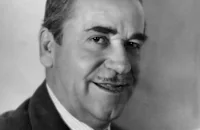A Soldier's Plaything

Brief Synopsis
Cast & Crew
Michael Curtiz
Lotti Loder
Harry Langdon
Ben Lyon
Jean Hersholt
Noah Beery
Film Details
Technical Specs

Synopsis
At the beginning of the war, Georgie Wilson, an irresponsible but likable citizen having no sympathy with the conflict, decides to stick to his all-night poker sessions, but his bashful friend, Tim, joins the Army. After a game, Georgie goes to Lola's apartment to pay a debt he owes her brother, and her sweetheart, Hank, accuses him of flirting and cheating. Georgie pushes him from a balcony and assumes that he killed him. To elude Hank's friends, Georgie and Tim enlist in the Army. His easy manner wins him many friends, and after the war, while with the Army of Occupation, Georgie falls in love with Gretchen, daughter of a cafe proprietor in Koblenz; but he decides to return to the States and clear his name before marrying her. He discovers, to his delight, that Hank is alive and also in the Army, and he promises to return to Gretchen as soon as he is discharged.

Director

Michael Curtiz
Cast

Lotti Loder

Harry Langdon
Ben Lyon

Jean Hersholt

Noah Beery
Fred Kohler
Lee Moran
Otto Matieson
Marie Astaire
Frank Campeau
Crew

Film Details
Technical Specs

Articles
A Soldier's Plaything
By Violet LeVoit














